ECTPP201A: Early Childhood Theories in Documentation and Assessment
VerifiedAdded on 2023/04/07
|7
|1495
|200
Essay
AI Summary
This essay discusses the significance of early childhood development theories in documentation, planning, and assessment. It highlights how these theories aid in understanding child behavior, strengthening positive behaviors, and redirecting problem behaviors. The essay also emphasizes the importance of pedagogical documentation in early childhood settings, noting its role in supporting educators, capturing broader experiences, and fostering partnerships with families. Pedagogical documentation helps in perceiving children as researchers, learning new habits of mind, and gaining insights into their thinking and feeling. It also creates a reflective and democratic pedagogical practice, highlighting the conceptual framework of children's interests and knowledge. The document concludes by emphasizing the role of pedagogical documentation in aiding the development of visual literacy skills for educators, which is useful in understanding the behavioural patterns of children.
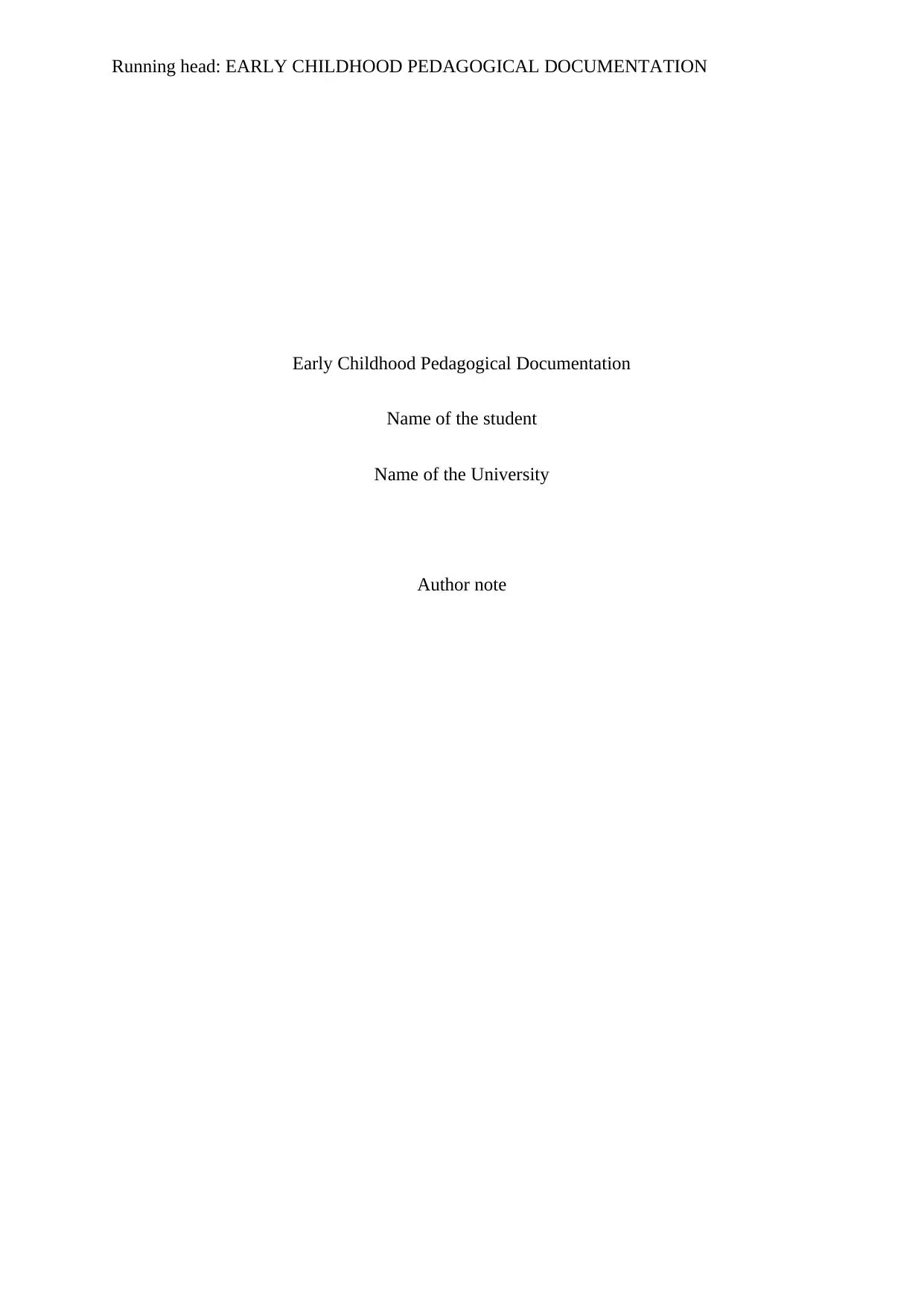
Running head: EARLY CHILDHOOD PEDAGOGICAL DOCUMENTATION
Early Childhood Pedagogical Documentation
Name of the student
Name of the University
Author note
Early Childhood Pedagogical Documentation
Name of the student
Name of the University
Author note
Paraphrase This Document
Need a fresh take? Get an instant paraphrase of this document with our AI Paraphraser
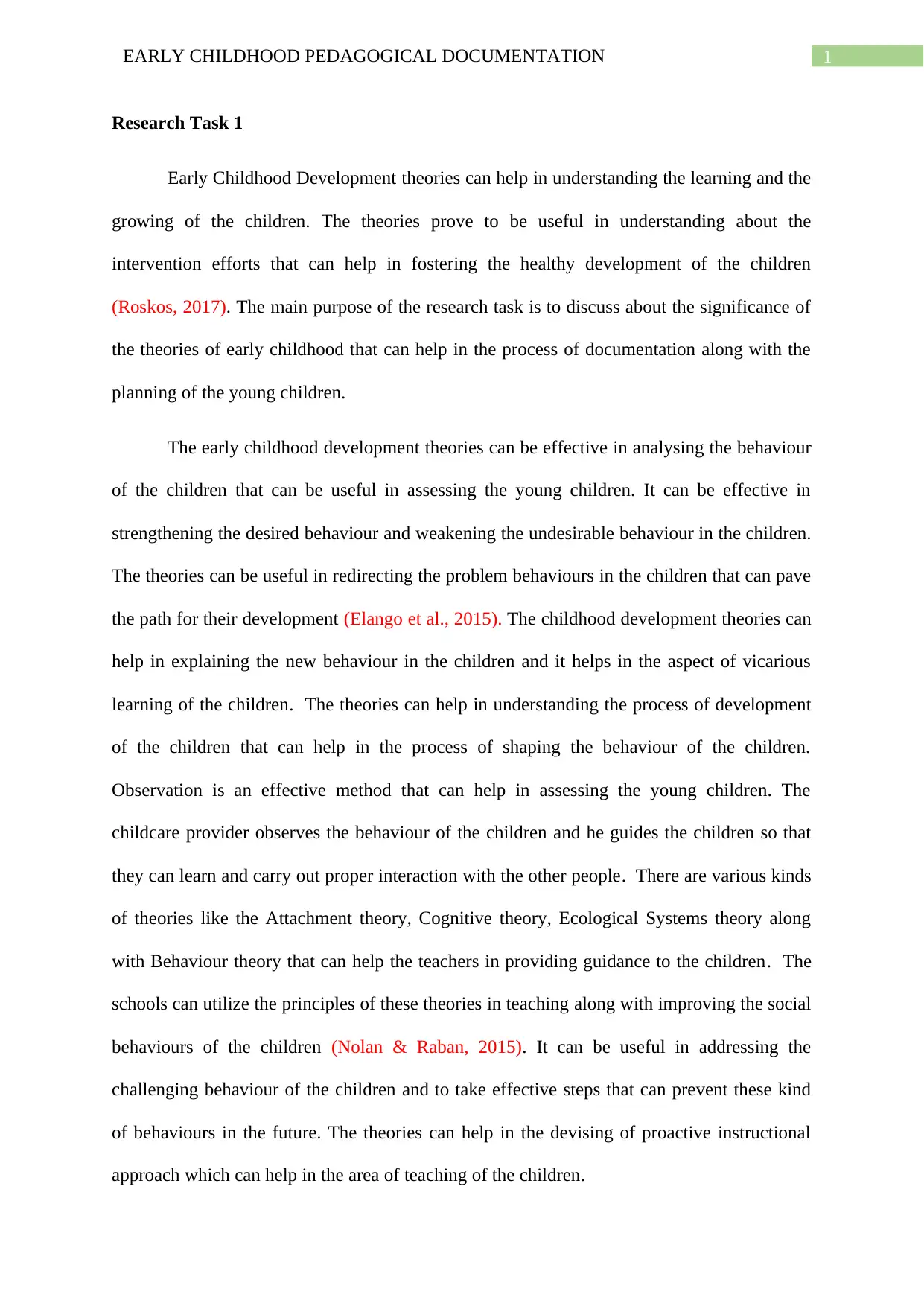
1EARLY CHILDHOOD PEDAGOGICAL DOCUMENTATION
Research Task 1
Early Childhood Development theories can help in understanding the learning and the
growing of the children. The theories prove to be useful in understanding about the
intervention efforts that can help in fostering the healthy development of the children
(Roskos, 2017). The main purpose of the research task is to discuss about the significance of
the theories of early childhood that can help in the process of documentation along with the
planning of the young children.
The early childhood development theories can be effective in analysing the behaviour
of the children that can be useful in assessing the young children. It can be effective in
strengthening the desired behaviour and weakening the undesirable behaviour in the children.
The theories can be useful in redirecting the problem behaviours in the children that can pave
the path for their development (Elango et al., 2015). The childhood development theories can
help in explaining the new behaviour in the children and it helps in the aspect of vicarious
learning of the children. The theories can help in understanding the process of development
of the children that can help in the process of shaping the behaviour of the children.
Observation is an effective method that can help in assessing the young children. The
childcare provider observes the behaviour of the children and he guides the children so that
they can learn and carry out proper interaction with the other people. There are various kinds
of theories like the Attachment theory, Cognitive theory, Ecological Systems theory along
with Behaviour theory that can help the teachers in providing guidance to the children. The
schools can utilize the principles of these theories in teaching along with improving the social
behaviours of the children (Nolan & Raban, 2015). It can be useful in addressing the
challenging behaviour of the children and to take effective steps that can prevent these kind
of behaviours in the future. The theories can help in the devising of proactive instructional
approach which can help in the area of teaching of the children.
Research Task 1
Early Childhood Development theories can help in understanding the learning and the
growing of the children. The theories prove to be useful in understanding about the
intervention efforts that can help in fostering the healthy development of the children
(Roskos, 2017). The main purpose of the research task is to discuss about the significance of
the theories of early childhood that can help in the process of documentation along with the
planning of the young children.
The early childhood development theories can be effective in analysing the behaviour
of the children that can be useful in assessing the young children. It can be effective in
strengthening the desired behaviour and weakening the undesirable behaviour in the children.
The theories can be useful in redirecting the problem behaviours in the children that can pave
the path for their development (Elango et al., 2015). The childhood development theories can
help in explaining the new behaviour in the children and it helps in the aspect of vicarious
learning of the children. The theories can help in understanding the process of development
of the children that can help in the process of shaping the behaviour of the children.
Observation is an effective method that can help in assessing the young children. The
childcare provider observes the behaviour of the children and he guides the children so that
they can learn and carry out proper interaction with the other people. There are various kinds
of theories like the Attachment theory, Cognitive theory, Ecological Systems theory along
with Behaviour theory that can help the teachers in providing guidance to the children. The
schools can utilize the principles of these theories in teaching along with improving the social
behaviours of the children (Nolan & Raban, 2015). It can be useful in addressing the
challenging behaviour of the children and to take effective steps that can prevent these kind
of behaviours in the future. The theories can help in the devising of proactive instructional
approach which can help in the area of teaching of the children.
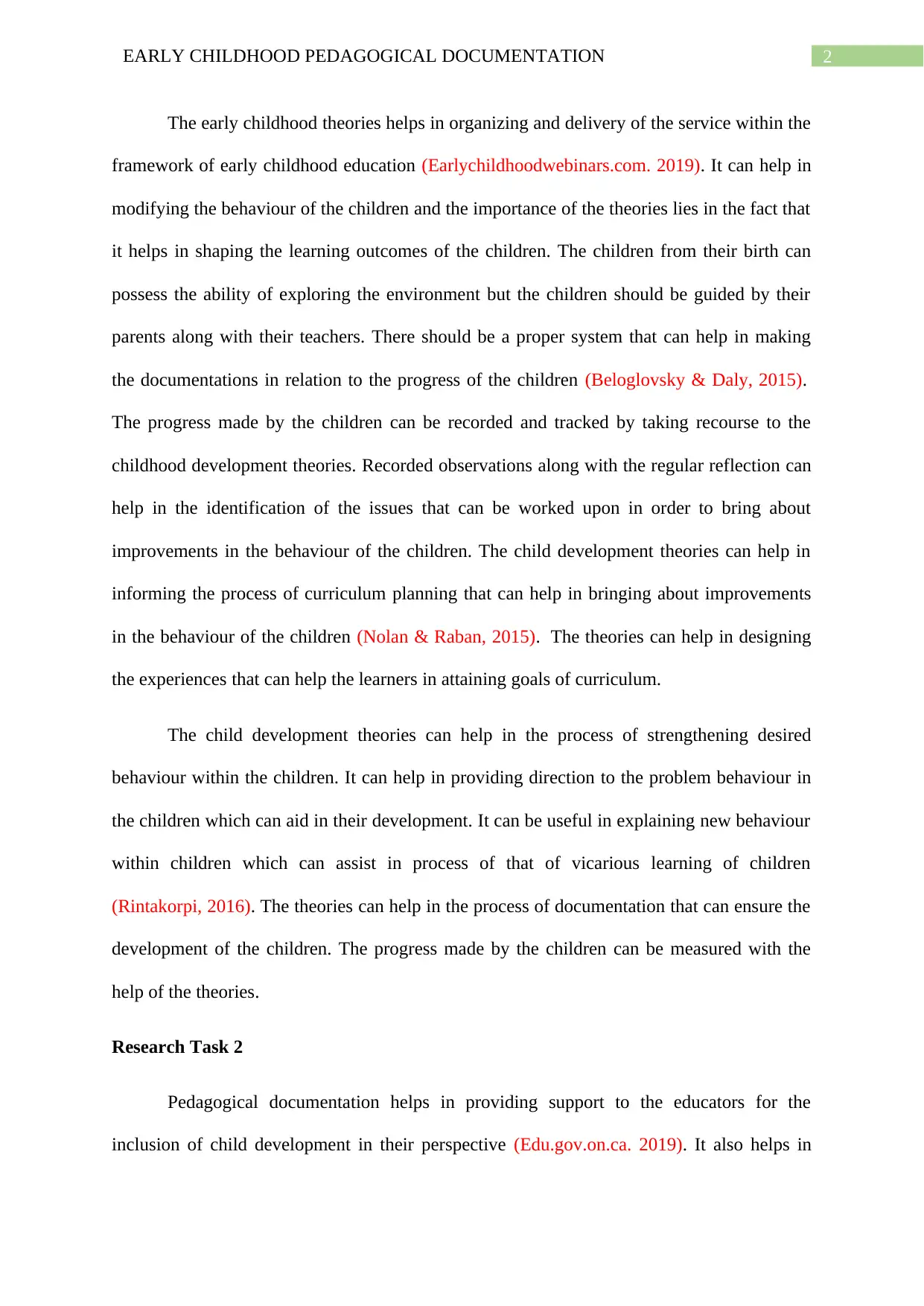
2EARLY CHILDHOOD PEDAGOGICAL DOCUMENTATION
The early childhood theories helps in organizing and delivery of the service within the
framework of early childhood education (Earlychildhoodwebinars.com. 2019). It can help in
modifying the behaviour of the children and the importance of the theories lies in the fact that
it helps in shaping the learning outcomes of the children. The children from their birth can
possess the ability of exploring the environment but the children should be guided by their
parents along with their teachers. There should be a proper system that can help in making
the documentations in relation to the progress of the children (Beloglovsky & Daly, 2015).
The progress made by the children can be recorded and tracked by taking recourse to the
childhood development theories. Recorded observations along with the regular reflection can
help in the identification of the issues that can be worked upon in order to bring about
improvements in the behaviour of the children. The child development theories can help in
informing the process of curriculum planning that can help in bringing about improvements
in the behaviour of the children (Nolan & Raban, 2015). The theories can help in designing
the experiences that can help the learners in attaining goals of curriculum.
The child development theories can help in the process of strengthening desired
behaviour within the children. It can help in providing direction to the problem behaviour in
the children which can aid in their development. It can be useful in explaining new behaviour
within children which can assist in process of that of vicarious learning of children
(Rintakorpi, 2016). The theories can help in the process of documentation that can ensure the
development of the children. The progress made by the children can be measured with the
help of the theories.
Research Task 2
Pedagogical documentation helps in providing support to the educators for the
inclusion of child development in their perspective (Edu.gov.on.ca. 2019). It also helps in
The early childhood theories helps in organizing and delivery of the service within the
framework of early childhood education (Earlychildhoodwebinars.com. 2019). It can help in
modifying the behaviour of the children and the importance of the theories lies in the fact that
it helps in shaping the learning outcomes of the children. The children from their birth can
possess the ability of exploring the environment but the children should be guided by their
parents along with their teachers. There should be a proper system that can help in making
the documentations in relation to the progress of the children (Beloglovsky & Daly, 2015).
The progress made by the children can be recorded and tracked by taking recourse to the
childhood development theories. Recorded observations along with the regular reflection can
help in the identification of the issues that can be worked upon in order to bring about
improvements in the behaviour of the children. The child development theories can help in
informing the process of curriculum planning that can help in bringing about improvements
in the behaviour of the children (Nolan & Raban, 2015). The theories can help in designing
the experiences that can help the learners in attaining goals of curriculum.
The child development theories can help in the process of strengthening desired
behaviour within the children. It can help in providing direction to the problem behaviour in
the children which can aid in their development. It can be useful in explaining new behaviour
within children which can assist in process of that of vicarious learning of children
(Rintakorpi, 2016). The theories can help in the process of documentation that can ensure the
development of the children. The progress made by the children can be measured with the
help of the theories.
Research Task 2
Pedagogical documentation helps in providing support to the educators for the
inclusion of child development in their perspective (Edu.gov.on.ca. 2019). It also helps in
⊘ This is a preview!⊘
Do you want full access?
Subscribe today to unlock all pages.

Trusted by 1+ million students worldwide
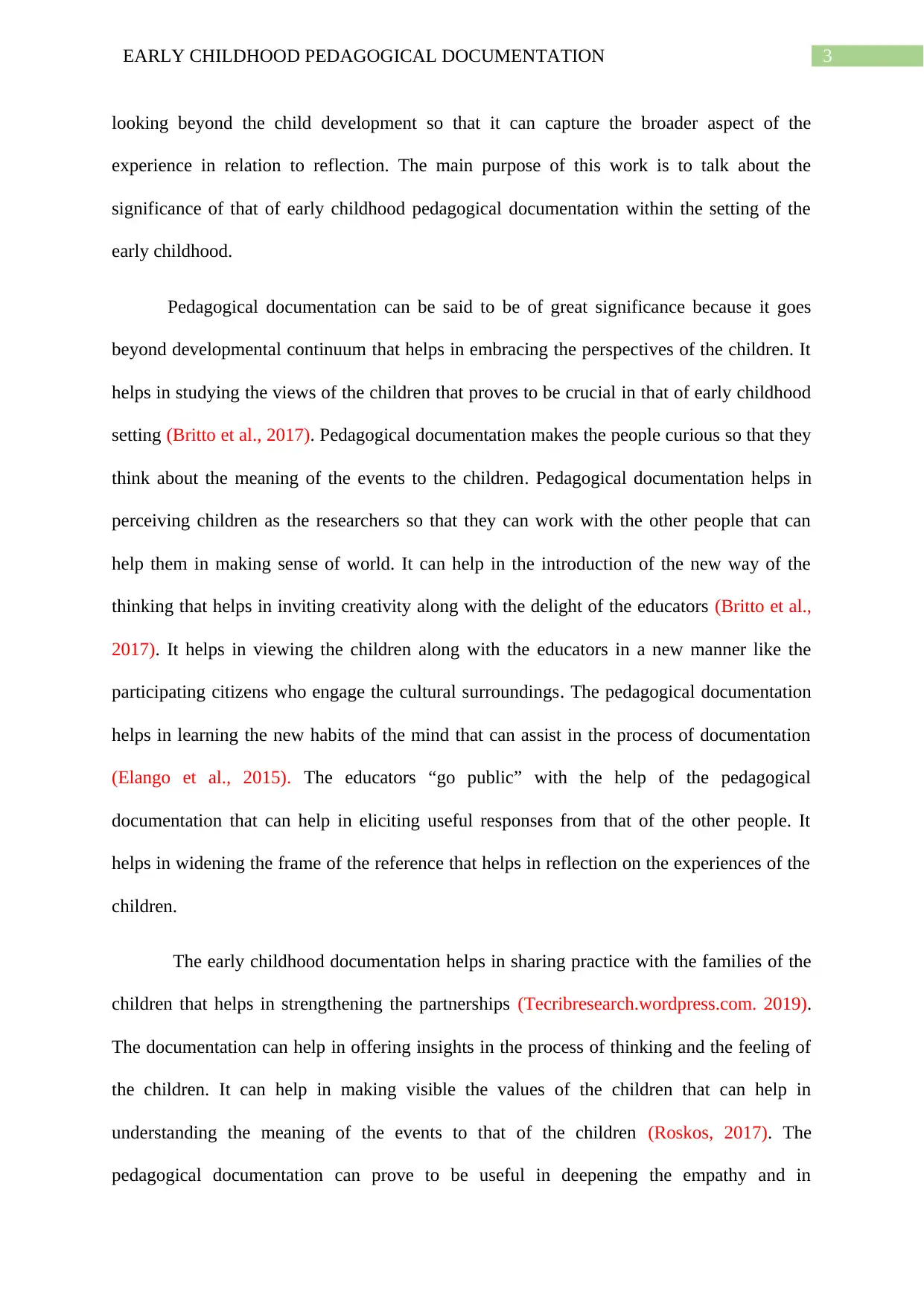
3EARLY CHILDHOOD PEDAGOGICAL DOCUMENTATION
looking beyond the child development so that it can capture the broader aspect of the
experience in relation to reflection. The main purpose of this work is to talk about the
significance of that of early childhood pedagogical documentation within the setting of the
early childhood.
Pedagogical documentation can be said to be of great significance because it goes
beyond developmental continuum that helps in embracing the perspectives of the children. It
helps in studying the views of the children that proves to be crucial in that of early childhood
setting (Britto et al., 2017). Pedagogical documentation makes the people curious so that they
think about the meaning of the events to the children. Pedagogical documentation helps in
perceiving children as the researchers so that they can work with the other people that can
help them in making sense of world. It can help in the introduction of the new way of the
thinking that helps in inviting creativity along with the delight of the educators (Britto et al.,
2017). It helps in viewing the children along with the educators in a new manner like the
participating citizens who engage the cultural surroundings. The pedagogical documentation
helps in learning the new habits of the mind that can assist in the process of documentation
(Elango et al., 2015). The educators “go public” with the help of the pedagogical
documentation that can help in eliciting useful responses from that of the other people. It
helps in widening the frame of the reference that helps in reflection on the experiences of the
children.
The early childhood documentation helps in sharing practice with the families of the
children that helps in strengthening the partnerships (Tecribresearch.wordpress.com. 2019).
The documentation can help in offering insights in the process of thinking and the feeling of
the children. It can help in making visible the values of the children that can help in
understanding the meaning of the events to that of the children (Roskos, 2017). The
pedagogical documentation can prove to be useful in deepening the empathy and in
looking beyond the child development so that it can capture the broader aspect of the
experience in relation to reflection. The main purpose of this work is to talk about the
significance of that of early childhood pedagogical documentation within the setting of the
early childhood.
Pedagogical documentation can be said to be of great significance because it goes
beyond developmental continuum that helps in embracing the perspectives of the children. It
helps in studying the views of the children that proves to be crucial in that of early childhood
setting (Britto et al., 2017). Pedagogical documentation makes the people curious so that they
think about the meaning of the events to the children. Pedagogical documentation helps in
perceiving children as the researchers so that they can work with the other people that can
help them in making sense of world. It can help in the introduction of the new way of the
thinking that helps in inviting creativity along with the delight of the educators (Britto et al.,
2017). It helps in viewing the children along with the educators in a new manner like the
participating citizens who engage the cultural surroundings. The pedagogical documentation
helps in learning the new habits of the mind that can assist in the process of documentation
(Elango et al., 2015). The educators “go public” with the help of the pedagogical
documentation that can help in eliciting useful responses from that of the other people. It
helps in widening the frame of the reference that helps in reflection on the experiences of the
children.
The early childhood documentation helps in sharing practice with the families of the
children that helps in strengthening the partnerships (Tecribresearch.wordpress.com. 2019).
The documentation can help in offering insights in the process of thinking and the feeling of
the children. It can help in making visible the values of the children that can help in
understanding the meaning of the events to that of the children (Roskos, 2017). The
pedagogical documentation can prove to be useful in deepening the empathy and in
Paraphrase This Document
Need a fresh take? Get an instant paraphrase of this document with our AI Paraphraser
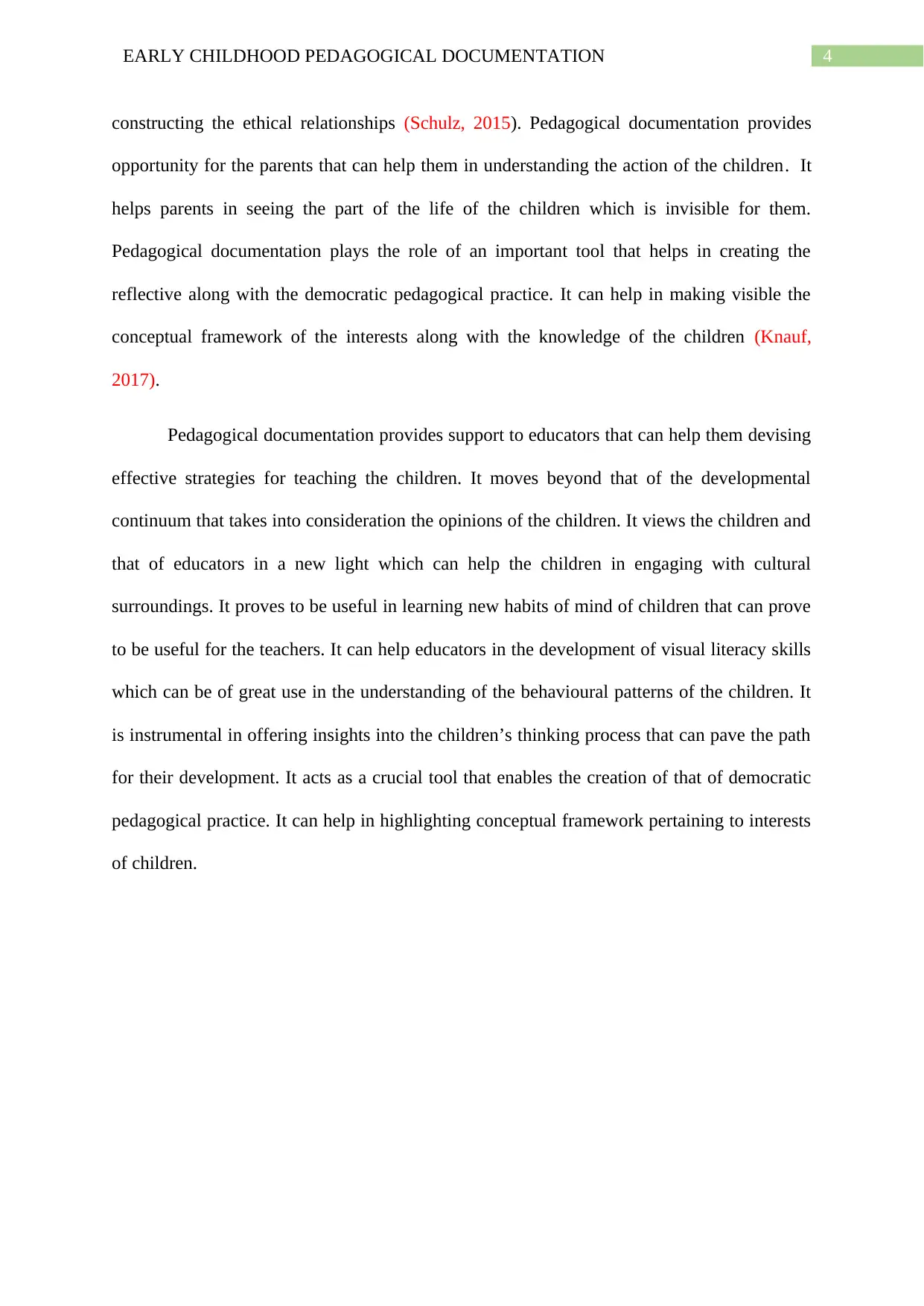
4EARLY CHILDHOOD PEDAGOGICAL DOCUMENTATION
constructing the ethical relationships (Schulz, 2015). Pedagogical documentation provides
opportunity for the parents that can help them in understanding the action of the children. It
helps parents in seeing the part of the life of the children which is invisible for them.
Pedagogical documentation plays the role of an important tool that helps in creating the
reflective along with the democratic pedagogical practice. It can help in making visible the
conceptual framework of the interests along with the knowledge of the children (Knauf,
2017).
Pedagogical documentation provides support to educators that can help them devising
effective strategies for teaching the children. It moves beyond that of the developmental
continuum that takes into consideration the opinions of the children. It views the children and
that of educators in a new light which can help the children in engaging with cultural
surroundings. It proves to be useful in learning new habits of mind of children that can prove
to be useful for the teachers. It can help educators in the development of visual literacy skills
which can be of great use in the understanding of the behavioural patterns of the children. It
is instrumental in offering insights into the children’s thinking process that can pave the path
for their development. It acts as a crucial tool that enables the creation of that of democratic
pedagogical practice. It can help in highlighting conceptual framework pertaining to interests
of children.
constructing the ethical relationships (Schulz, 2015). Pedagogical documentation provides
opportunity for the parents that can help them in understanding the action of the children. It
helps parents in seeing the part of the life of the children which is invisible for them.
Pedagogical documentation plays the role of an important tool that helps in creating the
reflective along with the democratic pedagogical practice. It can help in making visible the
conceptual framework of the interests along with the knowledge of the children (Knauf,
2017).
Pedagogical documentation provides support to educators that can help them devising
effective strategies for teaching the children. It moves beyond that of the developmental
continuum that takes into consideration the opinions of the children. It views the children and
that of educators in a new light which can help the children in engaging with cultural
surroundings. It proves to be useful in learning new habits of mind of children that can prove
to be useful for the teachers. It can help educators in the development of visual literacy skills
which can be of great use in the understanding of the behavioural patterns of the children. It
is instrumental in offering insights into the children’s thinking process that can pave the path
for their development. It acts as a crucial tool that enables the creation of that of democratic
pedagogical practice. It can help in highlighting conceptual framework pertaining to interests
of children.
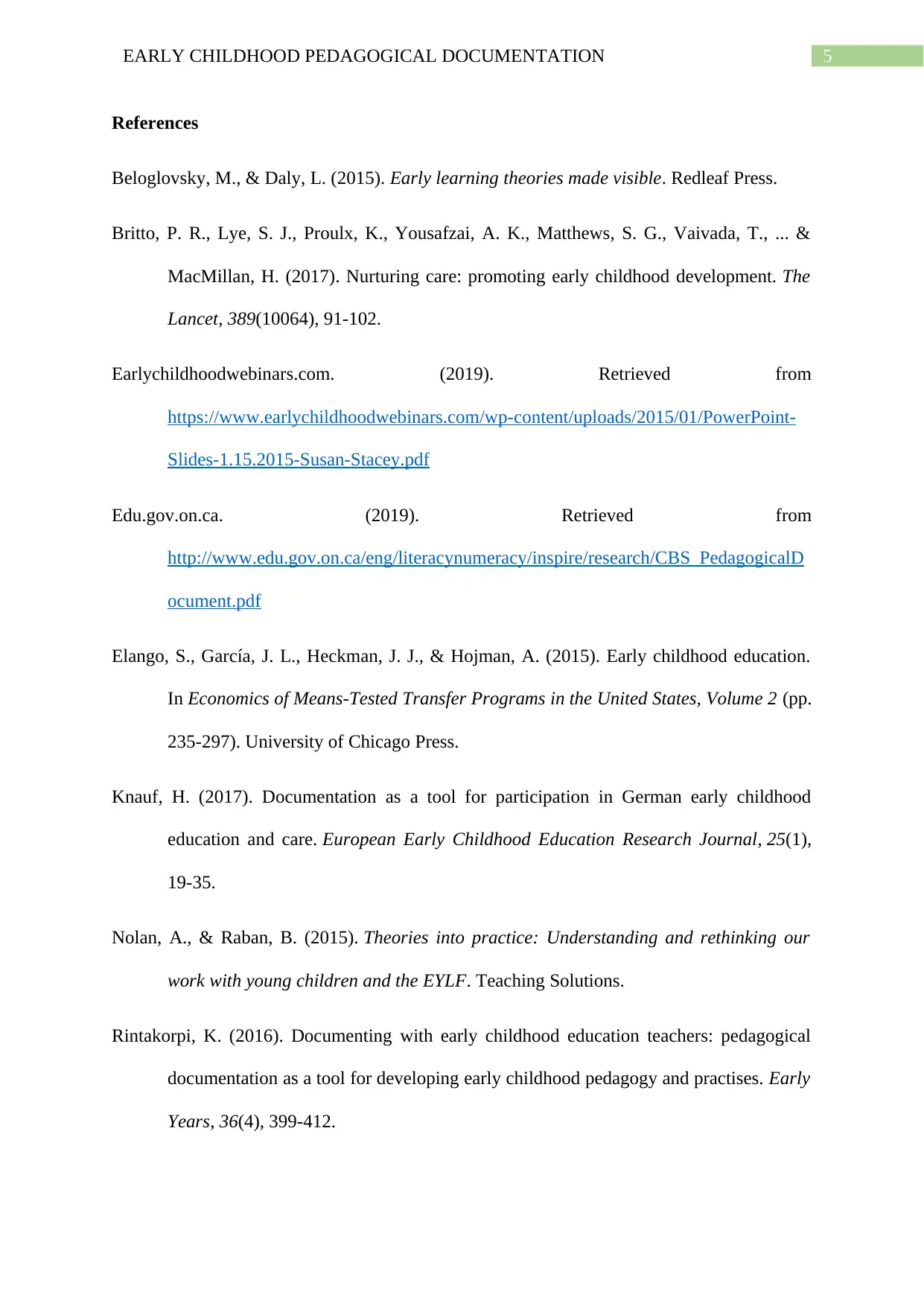
5EARLY CHILDHOOD PEDAGOGICAL DOCUMENTATION
References
Beloglovsky, M., & Daly, L. (2015). Early learning theories made visible. Redleaf Press.
Britto, P. R., Lye, S. J., Proulx, K., Yousafzai, A. K., Matthews, S. G., Vaivada, T., ... &
MacMillan, H. (2017). Nurturing care: promoting early childhood development. The
Lancet, 389(10064), 91-102.
Earlychildhoodwebinars.com. (2019). Retrieved from
https://www.earlychildhoodwebinars.com/wp-content/uploads/2015/01/PowerPoint-
Slides-1.15.2015-Susan-Stacey.pdf
Edu.gov.on.ca. (2019). Retrieved from
http://www.edu.gov.on.ca/eng/literacynumeracy/inspire/research/CBS_PedagogicalD
ocument.pdf
Elango, S., García, J. L., Heckman, J. J., & Hojman, A. (2015). Early childhood education.
In Economics of Means-Tested Transfer Programs in the United States, Volume 2 (pp.
235-297). University of Chicago Press.
Knauf, H. (2017). Documentation as a tool for participation in German early childhood
education and care. European Early Childhood Education Research Journal, 25(1),
19-35.
Nolan, A., & Raban, B. (2015). Theories into practice: Understanding and rethinking our
work with young children and the EYLF. Teaching Solutions.
Rintakorpi, K. (2016). Documenting with early childhood education teachers: pedagogical
documentation as a tool for developing early childhood pedagogy and practises. Early
Years, 36(4), 399-412.
References
Beloglovsky, M., & Daly, L. (2015). Early learning theories made visible. Redleaf Press.
Britto, P. R., Lye, S. J., Proulx, K., Yousafzai, A. K., Matthews, S. G., Vaivada, T., ... &
MacMillan, H. (2017). Nurturing care: promoting early childhood development. The
Lancet, 389(10064), 91-102.
Earlychildhoodwebinars.com. (2019). Retrieved from
https://www.earlychildhoodwebinars.com/wp-content/uploads/2015/01/PowerPoint-
Slides-1.15.2015-Susan-Stacey.pdf
Edu.gov.on.ca. (2019). Retrieved from
http://www.edu.gov.on.ca/eng/literacynumeracy/inspire/research/CBS_PedagogicalD
ocument.pdf
Elango, S., García, J. L., Heckman, J. J., & Hojman, A. (2015). Early childhood education.
In Economics of Means-Tested Transfer Programs in the United States, Volume 2 (pp.
235-297). University of Chicago Press.
Knauf, H. (2017). Documentation as a tool for participation in German early childhood
education and care. European Early Childhood Education Research Journal, 25(1),
19-35.
Nolan, A., & Raban, B. (2015). Theories into practice: Understanding and rethinking our
work with young children and the EYLF. Teaching Solutions.
Rintakorpi, K. (2016). Documenting with early childhood education teachers: pedagogical
documentation as a tool for developing early childhood pedagogy and practises. Early
Years, 36(4), 399-412.
⊘ This is a preview!⊘
Do you want full access?
Subscribe today to unlock all pages.

Trusted by 1+ million students worldwide
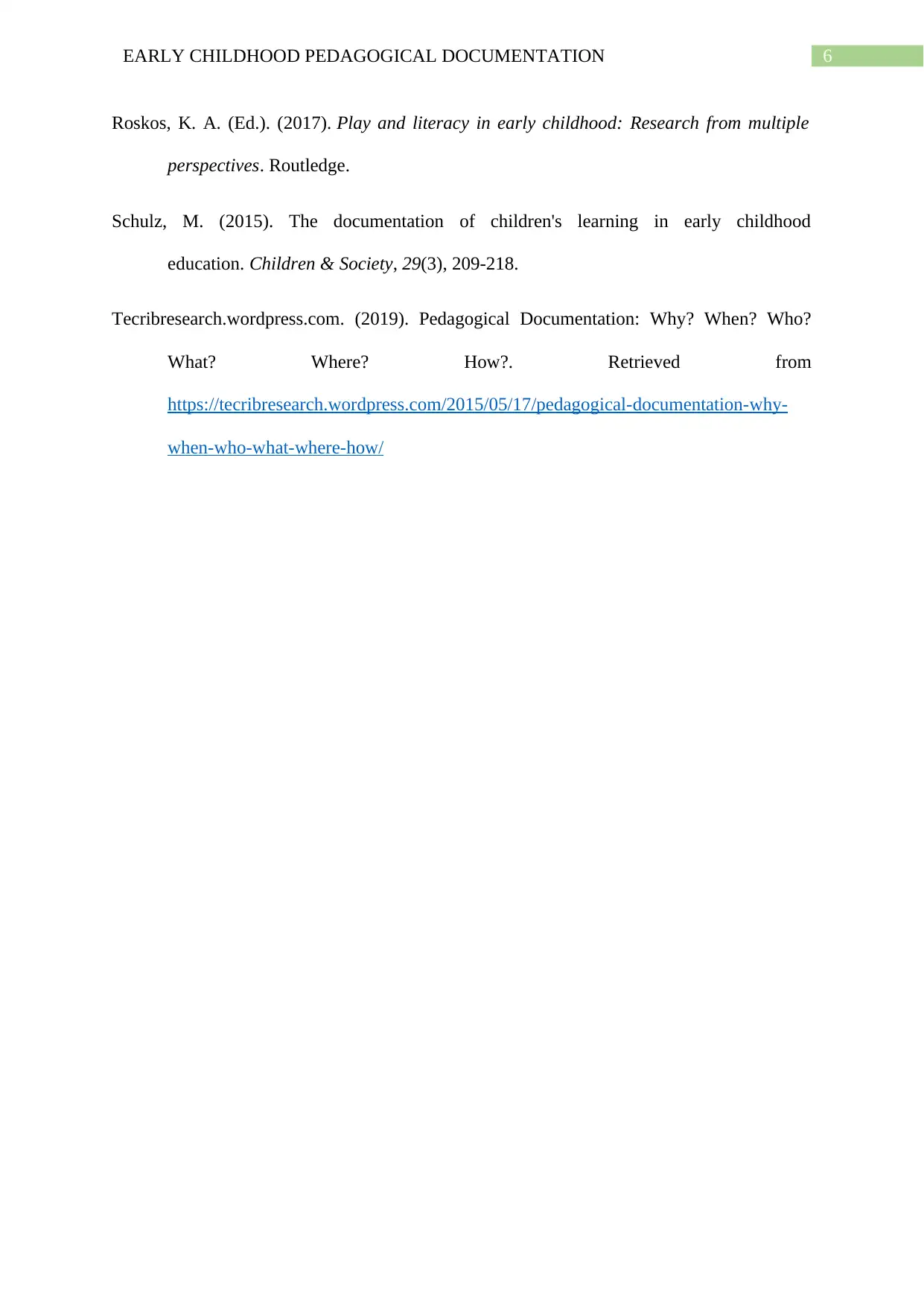
6EARLY CHILDHOOD PEDAGOGICAL DOCUMENTATION
Roskos, K. A. (Ed.). (2017). Play and literacy in early childhood: Research from multiple
perspectives. Routledge.
Schulz, M. (2015). The documentation of children's learning in early childhood
education. Children & Society, 29(3), 209-218.
Tecribresearch.wordpress.com. (2019). Pedagogical Documentation: Why? When? Who?
What? Where? How?. Retrieved from
https://tecribresearch.wordpress.com/2015/05/17/pedagogical-documentation-why-
when-who-what-where-how/
Roskos, K. A. (Ed.). (2017). Play and literacy in early childhood: Research from multiple
perspectives. Routledge.
Schulz, M. (2015). The documentation of children's learning in early childhood
education. Children & Society, 29(3), 209-218.
Tecribresearch.wordpress.com. (2019). Pedagogical Documentation: Why? When? Who?
What? Where? How?. Retrieved from
https://tecribresearch.wordpress.com/2015/05/17/pedagogical-documentation-why-
when-who-what-where-how/
1 out of 7
Related Documents
Your All-in-One AI-Powered Toolkit for Academic Success.
+13062052269
info@desklib.com
Available 24*7 on WhatsApp / Email
![[object Object]](/_next/static/media/star-bottom.7253800d.svg)
Unlock your academic potential
Copyright © 2020–2026 A2Z Services. All Rights Reserved. Developed and managed by ZUCOL.





